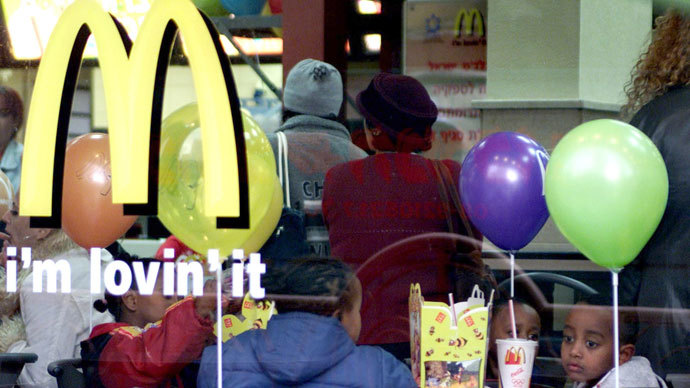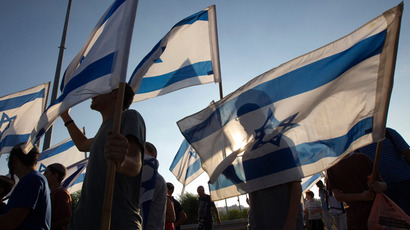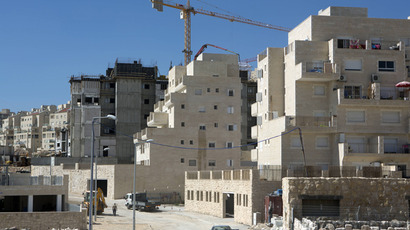'I'm not loving it': Furor as McDonald’s refuses to open in Israeli West Bank settlement

Israeli settlers are up in arms about McDonald’s refusal to build an outlet in the West Bank, calling to boycott the company’s entire operations in Israel. The chain cited a policy of “staying out of occupied territories” with other businesses joining in.
McDonald's stated that its refusal to operate in the West Bank "had always been the restaurant chain's policy" and that its decision was not coordinated with McDonald’s headquarters in the US.
The co-owner of the new mall in the town of Ariel located in central West Bank admitted that some other international companies which were asked to open up businesses in the mall have also declined. He refused to specify which ones.
"The mediators told us that branches operating abroad and other companies holding rights in Israel for international brand names are worried about the potential negative response toward their businesses [from consumers] abroad if they open shops in the mall," Tzahi Nahmias told Calcalist newspaper.
In response Israeli settlers have called to boycott McDonald’s altogether. The right-wing ‘My Israel’ Facebook page posted a “McDonald’s: I’m not loving it” sign in protest.

“McDonald’s has turned from a business into an organization with an anti-Israeli political agenda,” deputy director of the Council of Jewish Communities of Judea, Samaria and the Gaza Strip, Yigal Delmonti, told Jpost.
Ariel Mayor Eliyahu Shaviro said McDonald’s refusal is “unfortunate” and it “discriminates against the city’s residents,” adding that “issues of culture and commerce shouldn’t be subject to political considerations.”
Despite the fast-food conglomerate’s decision, the new spot will not remain empty. Burger Ranch has offered to step in and take McDonald’s place. In 2010, Burger Ranch had already taken over Burger King’s spots after the latter company closed all of its restaurants in Israel.
Israeli newspaper Haaretz quoted former Interior Minister Eli Yishai of Shas as saying on his Facebook page that he would “not only eat the first hamburger grilled by Burger Ranch, but he would also send McDonald's Israel owner Omri Padan ‘a current map with Israel’s up-to-date borders’".
Israeli settlements as obstacles to peace
Padan, the owner and CEO of McDonald’s Israel, is a former soldier in the IDF's elite Sayeret Matkal unit and one of the founders of the group Peace Now, which opposes all settlements and views them as obstacles to peace.
Reportedly Padan is no longer a member of the group, but that has always been his policy, according to Israeli business news site Globes. Padan reportedly first heard of the mall seven months ago and rejected the idea outright.
Haaretz quoted a source close to Padan saying that the whole thing is a media spin by one of the business investors in the Ariel mall’s investors who are trying to “push the mall forward.”
Peace Now has spoken out in support of McDonald’s refusal, stating that the company has a right to decide where to open up new branches and the right to follow its conscience.
“We totally understand and support people who think settlements are bad for Israel’s interests,” Executive Director of Peace Now Yariv Oppenheimer told AP. “They don’t want to take an active role by opening a business there and helping to expand and to contribute to the settlement idea.”

Haaretz also points that “not only is Ariel [with its 19,000 Jewish settlers] decidedly NOT a part of Israel, but it is even an outlier compared to all the other ‘settlement blocs’ that Israel swears allegiance to in any peace settlement.”
It is not the first time the McDonald’s, with its 170 branches in operation across Israel by now, is in the center of public uproar.
The company waited until 1993 to open its first branch in Israel due to an Arab League boycott of the country. A year later it was criticized for its large double arches sign near a memorial to Israel’s Golani military brigade, with critics saying it desecrated the site.
Boycotting Israeli settlements campaign
McDonald’s decision is expected to add significant weight to the international movement against Israel’s settlement construction in West Bank as many view the policy as illegal or illegitimate. The UN has repeatedly called for boycotting products made in Israeli settlements.
Activists around the world lead a campaign of encouraging consumers and businesses to internationally boycott products made there. Unions, groups and even countries have stepped-up their efforts to label settlement-made products being sold.
Some of the recent examples include: Caterpillar Inc., which reportedly provides bulldozers and other construction equipment in Israeli settlement territories, being removed from three ‘socially responsible’ stock indices by the American investment firm MSCI; the World Council of Churches calling for a boycott of products originating in Israeli settlements; and the UK’s Co-Operative Group stopping buying products from companies known to source from the settlements.
The Palestinians would like to have complete control over the West Bank, along with the Gaza Strip and East Jerusalem. Israel has captured those areas, along with the Golan Heights, in the 1967 Mideast War.
Despite the pressure, the Israeli settlement building continues as country’s planning committee on Wednesday granted final approval for the construction of 69 settler homes in east Jerusalem. The decision came hours before the US Secretary of State John Kerry’s visit to Jordan as part of his efforts to restart direct Israeli-Palestinian negotiations.














